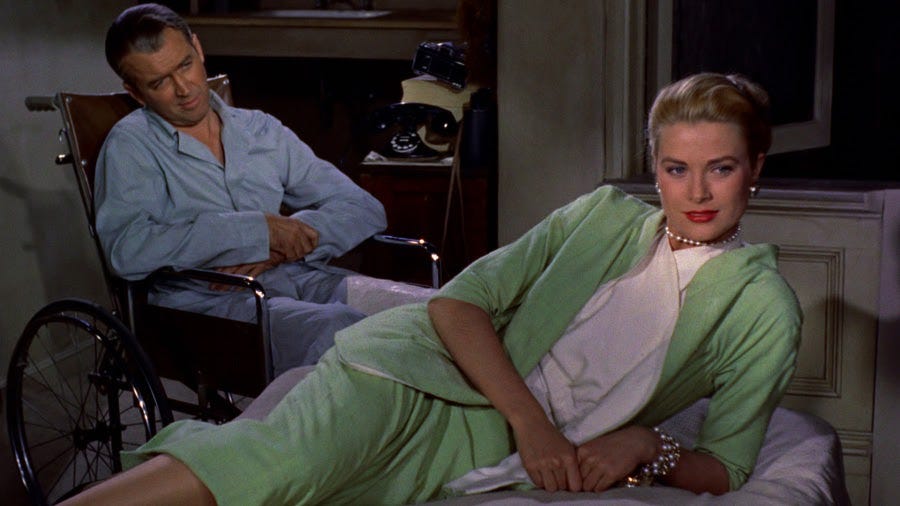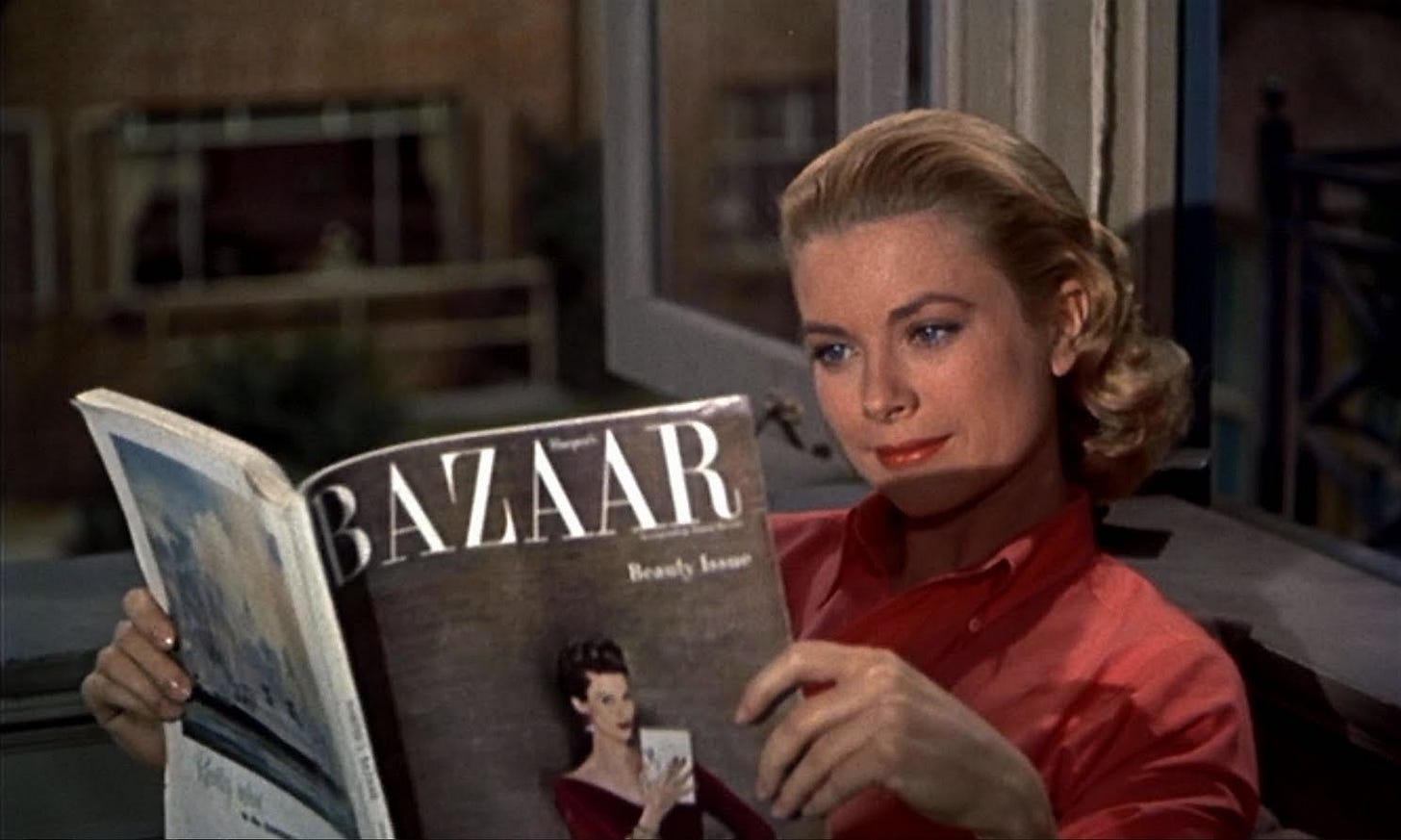'Rear Window' And The Modern Woman
My musings on Alfred Hitchcock, Lisa Fremont and leather handbags.
Rear Window is my favorite movie. It’s been my favorite movie ever since I saw it with my dad, who introduced it to me when I was in middle school, and I don’t think that will ever change. As an unabashed fan of crime thrillers, the simple premise of a photographer confined to his home who witnesses a murder while spying on his neighbors, intrigued me to no end. Directed by Alfred Hitchcock AKA “The Master of Suspense,” the 1945 classic has become endlessly rewatchable to me.
Following Netflix’s release of The Woman In The Window (which premiered on the platform last Friday), I decided to revisit Rear Window for the oompteenth time—seeing how the streaming original appears to be a modern retelling of it. Although it remains sexy, stressful and hilarious as ever, I picked up on some things I’d never much considered before.
As it turns out, Rear Window is a rom-com first and thriller second; the murder mystery merely used to explore the dynamics between Jeff and Lisa. It goes without saying that misogyny and gender dynamics play a huge role in Hitchcock’s character study, and deliberately so. I decided to concentrate on that this time around, and ended up pleasantly surprised by how well its messages hold up today.
Ahead come minor spoilers, so read at your own risk.
Modern Times
Rear Window was made during a time of rapidly increasing urbanization. As industrialization and war caused urban neighborhoods like Manhattan’s Greenwich Village to grow, social values began to change, and so did traditional roles for women—who were needed in the workforce. Artists like the ones in the movie were also forced to reevaluate outdated ideas and philosophies. This is where I think Hitchcock’s films deserve more credit, despite often being misinterpreted as misogynistic by today’s standards.
Many have called Rear Window a fascinating psychological thriller that explores the obsessive nature behind voyeurism. Because parody and self-consciousness both characterized modernist art, it wouldn’t be far-fetched to consider this film a director’s meta-commentary about his audience’s indulgence of the perverse. Regardless, one of the things that’s caused this simple, contained thriller to age better than the likes of Vertigo and Strangers On A Train, is the subtlety with which Hitchcock approaches this idea and more.
It goes without saying that classic Hollywood isn’t exactly known for its nuance. Neither was Hitchcock, as anyone frustrated by Psycho’s ending can attest. But Rear Window puts a different spin on the psychological thriller genre. Its low stakes, amusing tone and happy ending somewhat mask the protagonist’s reprehensible actions. Fact is, obsessively spying on your neighbors could go very wrong when your intuition’s off. This is pointed out by the supporting characters more than once, but because Jeff seems so down-to-earth and because his accusations are serious, we wave it off and they do too.
I believe that the same way those creepy undercurrents in Rear Window were intentional, Hitchcock deliberately uses the sexist dynamics between Jeff and Lisa to reflect on changing attitudes during the modernist period this film takes place in.
Female Intuition
In one of the first interactions between Jeff and his girlfriend Lisa, we hear them argue about the prospect of taking their relationship a step further. Lisa is in love with Jeff and wants to marry, but he isn’t ready for commitment yet. A high society Harper’s Bazaar writer, Lisa seems indulgent and high maintenance to him—a photojournalist with life-threatening responsibilities.
“Those high heels would be a lot of use in the jungle,” he tells her. “On this job you carry one suitcase. Your home is the available transportation. You sleep rarely, bathe even less and sometimes the food is made out of things you couldn’t even look at when they were alive!”
The scene ends with Lisa nearly dumping Jeff, who pleads that they keep things “status-quo.”
As the movie progresses however, we see Lisa do dangerous sleuthing work in those high heels, and teach Jeff the functional uses of a women’s handbag. Many of her newfangled ideas seem to improve upon what he’d always considered practical. As it turns out, a 13 x 9 ½ x 3” overnight case from Mark Cross fits all you’ll ever need on a short trip. “Compact, but ample enough,” as she says.
While other films would have had the female love interest change for her man or try to prove herself “worthy,” Lisa seems ambivalent to the irony. It’s never about “proving” herself to him, but he is still proven wrong.
Just as this film examines casual sexism, it’s also about deceiving first impressions. Jeff can’t help but judge books by their cover. Just like he unfairly musjudges Lisa, he has his own theories about “Miss Torso,” the ballerina who lives across from his apartment and enjoys frequent visits from male acquaintances.
As it turns out, her real boyfriend is a short, funny-looking soldier who returns from the war in the end. Similarly, “Miss Lonelyhearts” is only pitied by the other characters over the course of the film but she proves to have more agency than she’s given credit for, and even finds a mate by the time the credits roll.
In the film’s epilogue, we see that some time has passed, and Lisa and Jeff now live together. She’s dressed in a casual-chic outfit and reading a book about the Himalayas, showing that she seems to have embraced his interests. This is important because for all of Jeff’s flaws, an earlier scene had her waving away his passion for photojournalism, saying he should work from home and choose his own projects instead. When she sees that he’s asleep, she puts the book aside and grabs a copy of the newest Harper’s Bazaar issue.
Although the couple was able to compromise, Lisa got what she wanted without ever changing who she is—and Jeff learned not to underestimate her because of that.
“Careful, Tom”
Jeff’s chauvinism is also challenged over the course of the film.
Even before Jeff talks down on Lisa, several cringe-inducing exchanges between him and his caretaker, Stella, are meant for audiences to chuckle but also scorn at. When he tells her to make him a sandwich at the beginning of the film, it’s not unwarranted, seeing how he’s disabled and the two jab each other for fun constantly, but the sexist undertone is still there. And whenever he jokes about the nagging wives of his neighbors, it shows his unfavorable views on women and marriage.
“She’s a beautiful young woman, and you… a reasonably healthy specimen of manhood.”
- Stella on Lisa
Over the course of the film however, Lisa and Stella help Jeff solve a crime in ways he didn’t think they were capable of. Again, this is never to prove themselves to him, but his respect and admiration for them grows the more he realizes how mistaken he was.
Their female intuition also proves to be valuable when the two help Jeff solve this mystery as he deals with bureaucratic inefficiency. At one point, Jeff commissions his detective friend Tom Doyle to investigate Thorwald, but Doyle refuses to believe him and argues that they don’t have enough for a warrant. When Lisa takes Jeff’s side, Doyle belittles her and downplays her theories. After he makes a snarky remark about the two spending the night together, an irritated Jeff tells him to “be careful.”
Of course, Lisa ends up being right because women always are. Although I wonder how well this story could be told without a character like her in the mix, I haven’t seen Netflix’s female-led adaptation so it’ll be interesting to see what it brings to the table.
Regardless of the outcome, I could watch the people in Hitchcock’s massive apartment complex sets go about their lives for days on end. ■








And the appearance of Grace Kelly is not to be ever missed or forgotten.
So good, Ursula!